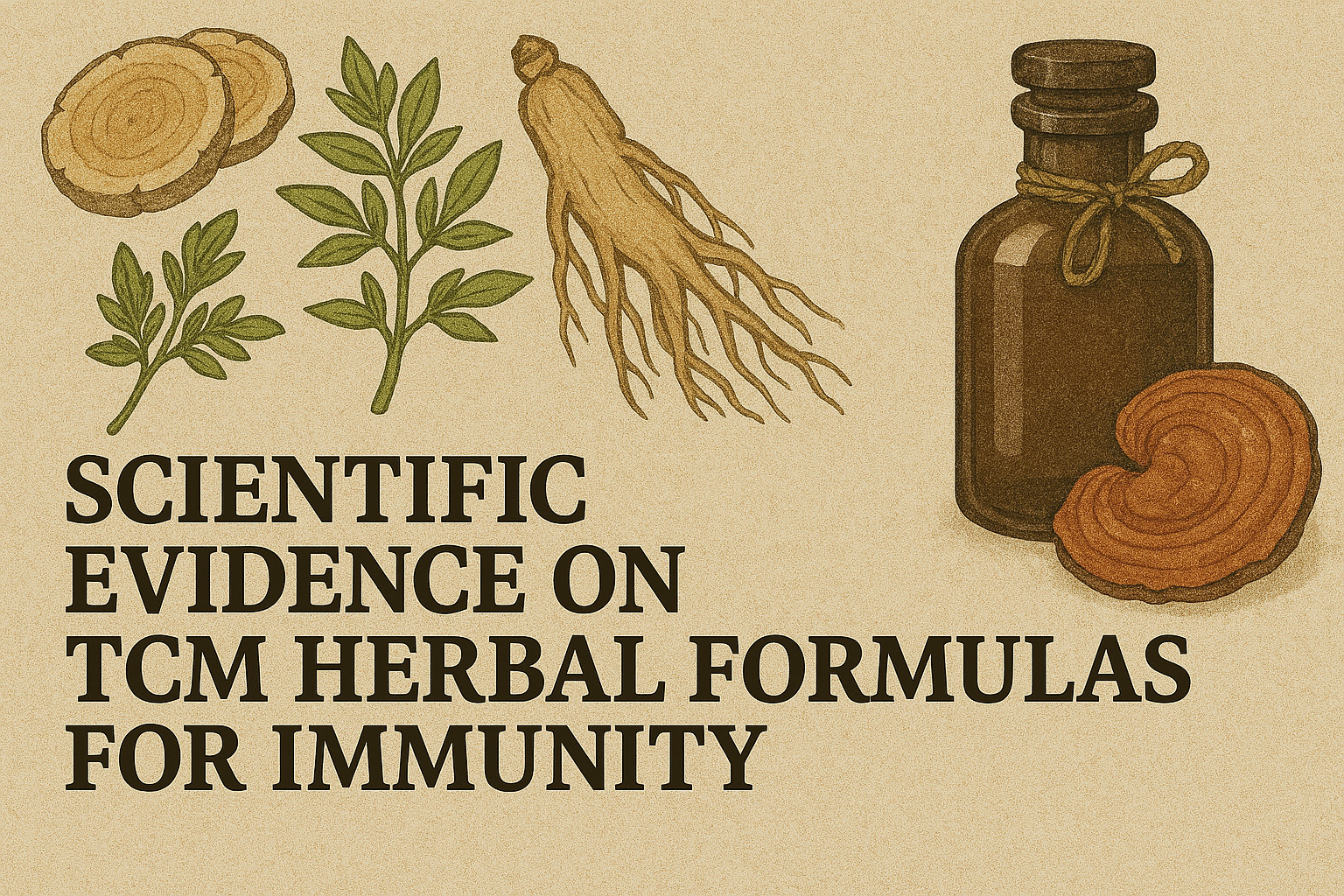As global interest in immune health rises, especially post-pandemic, Traditional Chinese Medicine (TCM) has garnered increasing attention for its preventive and supportive approaches. Among them, TCM herbal formulas play a central role in modulating the body’s resistance to illness, known traditionally as strengthening “Zheng Qi” (正气).
Modern research is beginning to validate what ancient texts described centuries ago — that certain herbs and formulas can positively influence immune regulation, inflammation control, and antiviral defense.
🔶 TCM View of Immunity: Zheng Qi vs. Pathogens
In TCM, the immune system isn’t a single structure but a dynamic network governed by:
- Wei Qi (Defensive Qi) – Protects the body’s surface, akin to immune surveillance.
- Zheng Qi (Upright Qi) – Overall vital resistance; a combination of Qi, Blood, and Yin-Yang balance.
- Lung and Spleen functions – Key to generating and distributing Wei Qi.
When Zheng Qi is strong, external pathogens (e.g., wind-cold, damp-heat) cannot invade easily. Weak Zheng Qi leads to recurrent illness and poor recovery.
🔶 Classical Formulas with Immune-Supporting Functions
| Formula | Function | Key Herbs |
|---|---|---|
| Yu Ping Feng San (Jade Windscreen Powder) | Strengthens Wei Qi, prevents colds | Huang Qi (Astragalus), Bai Zhu, Fang Feng |
| Sheng Mai San (Generate the Pulse Powder) | Tonifies Qi and Yin, for chronic fatigue or recovery | Ren Shen, Mai Dong, Wu Wei Zi |
| Liu Jun Zi Tang (Six Gentlemen Decoction) | Strengthens Spleen Qi, resolves Dampness | Dang Shen, Bai Zhu, Fu Ling, Chen Pi |
| Gan Mao Ling / Yin Qiao San | Early-stage colds and flu | Lian Qiao, Jin Yin Hua, Bo He, Niu Bang Zi |
These formulas don’t directly “kill viruses”, but rather help the body maintain internal strength and regulate immune response.
🔶 Modern Research Highlights
📌 Astragalus membranaceus (Huang Qi)
- Shown to increase macrophage activity, NK cell function, and antibody production.
- Used in China as an adjunct for immunodeficiency and post-chemo recovery.
📌 Glycyrrhiza uralensis (Licorice Root)
- Contains glycyrrhizin, studied for antiviral effects against SARS-related coronaviruses.
- Supports adrenal function and anti-inflammatory pathways.
📌 Lonicera japonica & Forsythia suspensa (Jin Yin Hua & Lian Qiao)
- Effective in reducing fever and inflammation in upper respiratory infections.
- Commonly used in combination (Yin Qiao San) during early flu symptoms.
📌 Polysaccharides from medicinal mushrooms (e.g., Ling Zhi / Reishi)
- Enhance cytokine modulation and overall immune tone.
🔶 Integrative Perspectives
While Western immunology focuses on targeted cellular mechanisms, TCM offers a systems-based approach to health — enhancing resistance, reducing susceptibility, and supporting recovery.
Emerging clinical trials in China and abroad are increasingly evaluating TCM herbs as adjunctive therapies, particularly in:
- Chronic fatigue
- Post-viral syndromes
- Respiratory tract infections
- Cancer-related immune suppression
🔶 Precautions & Personalization
- Not all immune formulas are universally safe — TCM requires pattern differentiation.
- For example, tonifying herbs like Ren Shen (Ginseng) are not suitable during acute fever.
- Always consult a trained practitioner for tailored guidance.
🔶 Conclusion
Modern research is beginning to confirm what centuries of practice in TCM have demonstrated: herbal formulas can enhance immunity, reduce disease frequency, and support long-term vitality. As more evidence accumulates, the bridge between ancient wisdom and modern medicine grows stronger — offering new hope for preventive health in the 21st century.


发表回复